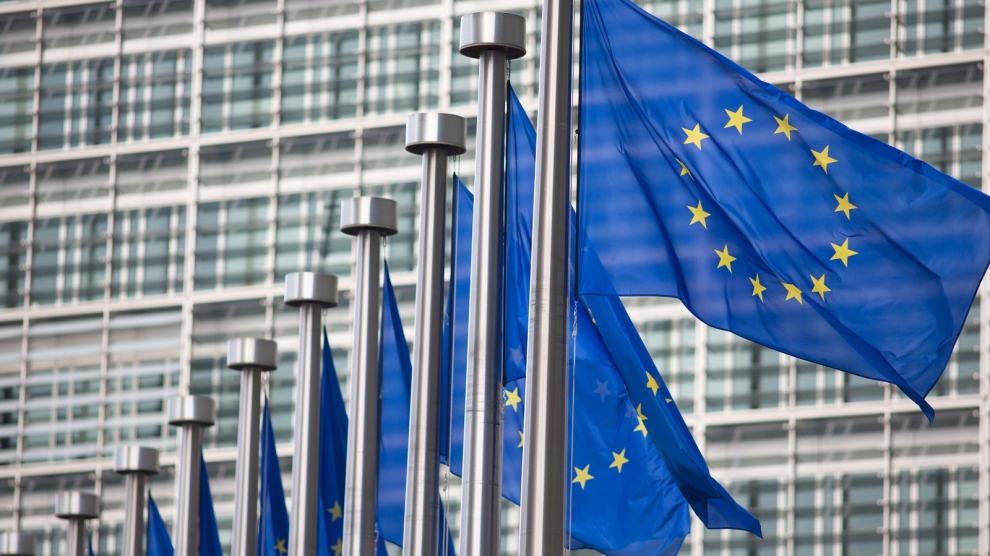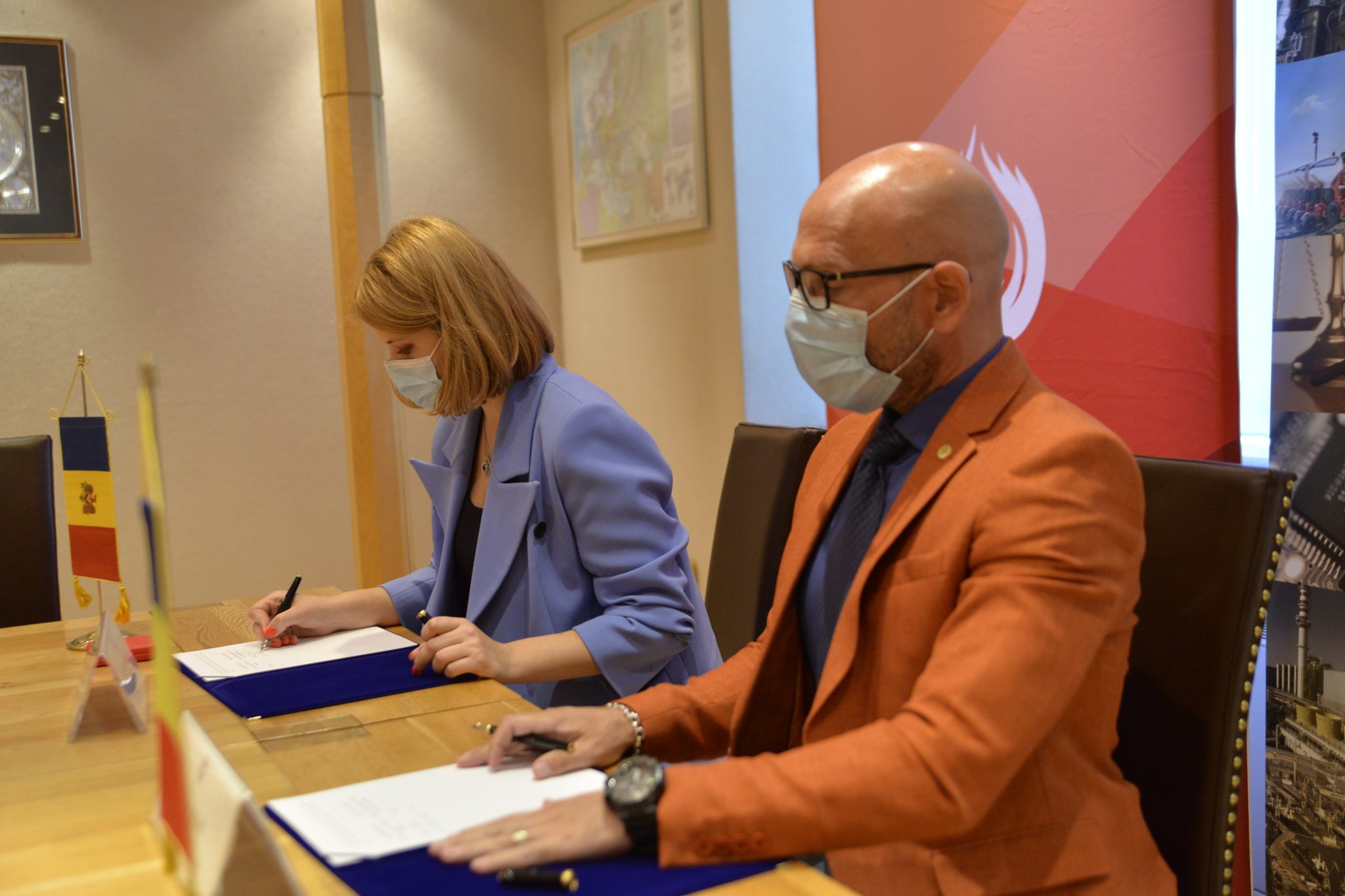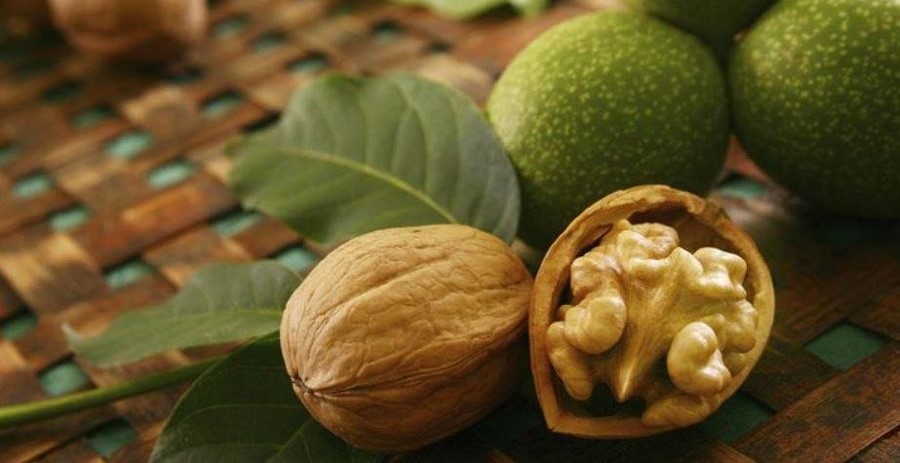Economy
EU-Moldova PCC – final statement and recommendations
Reading Time: 5 minutes Under the co-chairmanship of Mrs Marianne MIKKO (PES, Estonia) and Mr Victor STEPANIUC (Communist Party, Moldova) the eighth meeting of the EU-Moldova Parliamentary Cooperation Committee was held in C
EU-MOLDOVA PARLIAMENTARY COOPERATION COMMITTEE
EIGHTH MEETING
6-7 October 2005
CHISINAU
Co-Chairmen: Mrs MIKKO and Mr STEPANIUC
Final Statement and Recommendations
pursuant to Article 89 of the Partnership and Cooperation Agreement
Under the co-chairmanship of Mrs Marianne MIKKO (PES, Estonia) and Mr Victor STEPANIUC (Communist Party, Moldova) the eighth meeting of the EU-Moldova Parliamentary Cooperation Committee was held in Chisinau on 6-7 October 2005. The Committee exchanged views with Mrs Benita FERRERO-WALDNER, Commissioner on Foreign Relations, on behalf of the European Commission, Mr Sergiu SAINCIUC, Vice-Minister of Economy and Trade of the Republic of Moldova, on behalf of the government of the Republic of Moldova and H.E. Mr Bernard WHITESIDE, British Ambassador to the Republic of Moldova, on behalf of the British Presidency-in-Office of the Council of the European Union.
The Parliamentary Cooperation Committee agreed the following:
EU-Moldova relations
1. stresses that the Republic of Moldova has deep historical, cultural and economic links to the Member States of the European; reiterates its view that the EU-Moldova relationship must be based on shared common values with regard, in particular, to democracy, the rule of law and respect for human and civil rights; underlines that the development of the Republic of Moldova as a stable and prosperous country is in the shared interest of both the European Union and of Moldova itself;
2. underlines the importance of the EU and Moldova working together to contribute to stability, security and prosperity in the region and on the European continent as a whole and to prevent the emergence of new dividing lines;
3. welcomes the adoption of the EU-Moldova Action Plan; emphasises the importance of the Plan for reinforcing EU-Moldova relations and for underpinning political and economic reform in Moldova; stresses too that the successful implementation of the Action Plan should assist Moldova towards a significant degree of economic integration and a deepening of political co-operation with the EU; also emphasises that in the near future the Partnership and Cooperation Agreement remains a valid basis for EU-Moldova cooperation; welcomes the recent formation of a stable and broad-based government committed to early and significant reform;
4. welcomes the steps taken by the European Union to deepen its engagement with the Republic of Moldova; applauds in particular the opening of a permanent European Commission delegation in Chisinau and stresses that this delegation needs to strengthen significantly the political influence of the Union in the country and provide a focus for its activities; underlines the need for adequate funding to be made available to ensure its effective operation;
5. welcomes the appointment of an EU Special Representative (EUSR) for Moldova, as a sign of the EU’s engagement, in particular to contributing towards a sustainable settlement of the Transnistria conflict, in accordance with agreed EU policy objectives and in close coordination with the OSCE; welcomes the enlargement of the negotiation process by involving the EU and USA as observers;
6. takes note of the conclusions of the 7th EU-Moldova Cooperation Council that took place in Brussels on 22 February 2005;
Economic and social situation
7. notes that the Action Plan sets out a comprehensive series of priorities and that it provides the opportunity for convergence of economic legislation, the opening of economies to each other, and the continued reduction of trade barriers which will stimulate investment and growth;
8. reiterates its call on the Moldovan authorities to make effective progress on economic and structural reform including social protection and to improve the business and investment climate, especially ensuring a transparent and predictable business environment, bearing in mind the importance of sustainable development; underlines that the adoption and implementation of reform legislation are essential steps; calls on the government to improve the necessary structure of public administration to ensure successful implementation of these reforms;
9. stresses that the Action Plan will build a solid foundation for further economic integration based on the adoption and implementation of economic and trade-related rules with the potential to enhance trade investment and growth;
10. expresses concern at the continuing reports of corruption and trafficking of human beings mainly from Moldova, especially of women and children: takes note of the establishment by the Moldovan authorities of a regional centre to tackle this scourge and stresses the need for concrete measures to rescue and rehabilitate the victims and bring the criminals to justice: underlines that information and public prosecution of those responsible in individual cases is the best and most persuasive way to prevent the repetition of this most inhuman trafficking and would therefore save many innocent women and children;
Rule of law
11. notes that the rule of law is an essential precondition for closer relations between the European Union and Moldova and stresses therefore that the strengthening of the relevant principles and effectiveness of institutions guaranteeing the rule of law is of the utmost importance;
12. calls for the reinforcement of Moldova’s judicial capacity and further strengthening of the independence of judiciary;
Human rights and freedom of expression in the Republic of Moldova
13. welcomes the conclusion of the international observer mission that the Moldovan parliamentary elections of 6 March 2005 were generally in compliance with most OSCE and Council of Europe commitments and international standards; notes nonetheless that the observers concluded that the elections fell short of meeting some commitments that are central to a genuinely competitive election process: urges therefore the Government of Moldova to ensure that the shortcomings identified regarding campaign and media conditions are satisfactorily addressed;
14. stresses that opposition parties and minority interests must have a full opportunity to participate actively in the political course of the country; underlines that there should be no interference by the executive that restricts the free action of opposition parties;
15. appreciates the initial steps undertaken by the Moldovan authorities in the process of legislative reform: underlines the importance of drawing on the international expertise of ODIHR and the Venice Commission in order to assure further implementation of reforms and the improvement of the remaining shortcomings;
Situation in Transnistria
16. underlines once more that the resolution of the Transnistria issue is a fundamental element in promoting economic prosperity and political stability in the whole of the Republic of Moldova; stresses again the need for a peaceful solution to the conflict, in line with the UN Charter and Conventions, OSCE declarations and with full respect for the sovereignty and territorial integrity of the Republic of Moldova within its internationally recognised borders;
17. calls again for the complete fulfilment of the OSCE Istanbul commitments and expresses concern over the lack of progress in the withdrawal of Russian arms and troops from the territory of Moldova; urges the Russian government to put pressure on the Tiraspol authorities to facilitate the process;
18. applauds the plans for an EU border mission on the Moldova-Ukraine border as welcome signs of enhanced engagement by the European Union in the search for a settlement of the Transnistria problem; stresses that better controls on the border are an essential element in bringing the conflict to an end: calls for this process of deeper EU engagement to be accelerated; welcomes the signing of the Memorandum of Understanding on the EC Border Assistance Mission to the Republic of Moldova and Ukraine in order to establish an international monitoring mechanism for an efficient customs and border control at the Moldovan-Ukrainian state border: calls for the EU border mission to form the nucleus of a full ESDP mission in the future and to form part of a policy of greater EU engagement in Moldova;
19. welcomes the involvement of the Ukrainian authorities in the search for a resolution of the dispute and the initiative of President Yushchenko to promote a settlement within the framework of a democratic Moldova; welcomes the documents passed by the Parliament of the Republic of Moldova related to the Ukrainian Plan for the settlement of the Transnistrian problem, including the Law on Fundamental Regulations of the Special Legal Status of Settlements on the left Bank of the River Nistru (Transnistria) of 22 July 2005;
20. expresses great concern that manufacture of weapons and ammunition may be taking place in the region with the obvious inherent dangers.
Economy
Moldova will receive a disbursement of 36 million euros as part of the the Economic Recovery Plan

This week, the European Commission approved the disbursement of 36 million euros in grant money for the Republic of Moldova. The announcement was made by Deputy Director-General for Neighbourhood Policy and Enlargement Negotiations at the European Commission, Katarina Mathernova, who paid an official visit to the Republic of Moldova between September 13-15, together with Managing Director for Russia, Eastern Partnership, Central Asia, Regional cooperation and OSCE, at the European External Action Service, Michael Siebert.
The EU officials had meetings with President Maia Sandu, Minister of Foreign Affairs and European Integration, Nicu Popescu, Speaker of Parliament, Igor Grosu, Prime Minister of the country, Natalia Gavrilita, as well as key representatives of Government, international financial institutions and the civil society, according to a press release issued by the Delegation of the European Union to the Republic of Moldova.
Beside such topics as the EU-Moldova relations and prospects, the priorities of the reform agenda of the new Moldovan Government, preparations for the Eastern Partnership Summit at the end of the year and the Transnistrian conflict settlement, the officials also discussed the EU assistance in support of reforms and the Economic Recovery Plan for Moldova, which was announced in June with a total EU support of 600 million euros over the next 3 years.
“The first measures under the Economic Recovery Plan will shortly materialize, with the expected disbursement of 36 million euros in grant money under budget support programmes to support the authorities’ efforts to fight against the consequences of the pandemic. Moldova can count on EU’s assistance on its path to reforms and to recovery, bringing tangible results to citizens,” Katarina Mathernova stated.
The plan is based on assistance provided by the European Union through various bilateral and regional instruments, aiming to mobilize the funds in the form of grants, loans, guarantees and macro-financial assistance.
“The Economic Recovery Plan for the Republic of Moldova involves much more, not just this financial support provided immediately. It must help digital transformation, strengthen infrastructure, energy efficiency, education and support small and medium-sized enterprises,” the EU official also said.
As Prime Minister Natalia Gavrilita informed, “The Economic Recovery Plan and the 5 flagship initiatives for Moldova in the Eastern Partnership will directly contribute to the reform and consolidation of institutions, stimulate long-term socio-economic development, bring direct benefits to citizens, and unleash new economic opportunities through promoting the green agenda and digitization. Small and medium-sized enterprises (SMEs) have been hit hard by the crisis. Promoting and diversifying access to finance and reducing collateral requirements will be essential in supporting economic operators. We are grateful to the EU partners who will launch two programs to support 50 000 independent Moldovan SMEs to adapt to the new conditions.”
President of the Republic of Moldova, Maia Sandu, welcomed the decision of the European Union to disburse about 745 million lei in grant money, as the official page of the President’s Office announced. “EU support comes after a long period of freezing of European assistance, caused by former governments. We managed to relaunch the political dialogue with the European Union and resume financial assistance. The Republic of Moldova is gradually regaining the trust of its strategic partners. This European support is also a signal of encouragement for the new Government team in its commitment to clean up the institutions, fight corruption and launch development programs in the country,” said Maia Sandu.
Photo: unknown
Economy
Romania and Moldova signed a partnership memorandum pledging to cooperate in promoting their wines

The Chamber of Commerce and Industry of Romania (CCIR) and the National Office for Vine and Wine (NOVW) of the Republic of Moldova signed, last week, a memorandum of cooperation on organizing joint promotional activities in the markets of common interest, as the CCIR announced.
China, Japan or the USA are just some of the markets targeted by the Romanian and Moldovan institutions. The memorandum also involves advertising activities for wines from common indigenous varieties, promoting the oeno-tourist region, developing a tourist route in the two states, exchange of experience, study visits, and mutual support in identifying new export opportunities. “We are very confident that this collaboration between our organizations will lead to sustainable economic growth and a higher degree of well-being among Moldovans and Romanians,” claimed Deputy Secretary-General of CCIR, Bogdan Visan.
On the other hand, Director of the NOVW, Cristina Frolov, declared that no open competition with Romania is aimed at the governmental level of the Republic of Moldova. “This request for collaboration is a consequence of the partnership principle. Romania imports 10-12% of the wine it consumes, and we want to take more from this import quota. Every year, the Romanian market grows by approximately 2.8%, as it happened in 2020, and we are interested in taking a maximum share of this percentage of imported wines without entering into direct competition with the Romanian producer,” the Moldovan official said. She also mentioned that Moldova aims at increasing the market share of wine production by at least 50% compared to 2020, and the number of producers present on the Romanian market – by at least 40%.

Source: ccir.ro
**
According to the data of the Romanian National Trade Register Office, the total value of Romania-Moldova trade was 1.7 billion euros at the end of last year and over 805 million euros at the end of May 2021. In July 2021, there were 6 522 companies from the Republic of Moldova in Romania, with a total capital value of 45.9 million euros.
The data of Moldova’s National Office of Vine and Wine showed that, in the first 7 months of 2021, the total quantity of bottled wine was about 27 million litres (registering an increase of 10% as compared to the same period last year), with a value of more than one billion lei, which is 32% more than the same period last year. Moldovan wines were awarded 956 medals at 32 international competitions in 2020.
Photo: ccir.ro
Economy
Moldova’s hope to be a top walnut exporter and its main difficulties

The Republic of Moldova has perfect weather conditions for growing walnut trees, that creating a great potential of walnut production and trade, especially on international markets, where the demand is way higher than the product’s supply. National and international experts believe that the country’s walnut production industry is on the verge of important transformations, which could lead to increased yields, quality and competitiveness worldwide.
According to authorities, Moldova exports 34-35 thousand tons of walnuts in shell, which is about 7% of the total export of fruit and 5% of the total export of horticultural products. The export value is assessed as being $120 million, that being 57-60% of the total fruit export value and about 50% of horticultural export value. Most of walnut crops are exported to the EU countries, such as France, Germany, the Netherlands, Romania and Austria. The country’s exports were among the world’s top 10 when it comes to the highest dollar value of the product during 2020.
Viorel Gherciu, Minister of Agriculture and Food Industry, pointed out that the production in the domestic walnut industry has increased by 55% in the last five years, which ranks Moldova among the main producers in the world.
“The biggest opportunity for this industry is that we are in the geographical proximity of the largest walnut import area in the world, which is the European Union, with almost 40% of total imports in the world. We are on the EU border, with privileged relations, with an Association Agreement. We already enjoy a good relationship in working with European importers, they trust our processors. A very close collaboration has been created and this is, in fact, the guarantee for those who invest in the area,” claimed the president of the Walnut Producers Association, Oleg Tirsina.
The data provided by the National Bureau of Statistics show that there are 34.7 thousand hectares of walnut plantations in the country. 20.90 hectares are represented by orchards. 75% of planted orchards are formed of old varieties trees. 30-35% of the exported production comes from orchards, the rest comes from individual farmers and plantations along the roads. This means that the quality of walnut production is not at its maximum potential. Developing commercial plantations through orchards modernization and extension of walnut varieties would provide double yield and better quality, experts say.
Governmental support in the form of subsidizing solutions, foreign investments and credit options are indispensable for the industry development. One of the financing options is the credit line of the European Investment Bank Project. Since 2016, 15 producers and processors of nuts, almonds and hazelnuts have benefited from these loans with the total amount of investments worth 8.7 million euros. A further extension of the project would provide another 60 million euros for the modernization of the horticultural sector in general and for harvesting organic walnuts in particular.
Photo: heymoldova.com





















